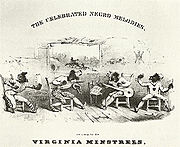
Virginia Minstrels
Encyclopedia

United States
The United States of America is a federal constitutional republic comprising fifty states and a federal district...
entertainers known for helping to invent the entertainment form known as the minstrel show
Minstrel show
The minstrel show, or minstrelsy, was an American entertainment consisting of comic skits, variety acts, dancing, and music, performed by white people in blackface or, especially after the Civil War, black people in blackface....
. Led by Dan Emmett, the original lineup consisted of Emmett, Billy Whitlock
Billy Whitlock
William M. "Billy" Whitlock was an American blackface performer. He began his career in entertainment doing blackface banjo routines in circuses and dime shows, and by 1843, he was well known in New York City. He is best known for his role in forming the original minstrel troupe, the Virginia...
, Dick Pelham, and Frank Brower
Frank Brower
Francis "Frank" Marion Brower was an American blackface performer active in the mid-19th century. Brower began performing blackface song-and-dance acts in circuses and variety shows when he was 13. He eventually introduced the bones to his act, helping to popularize it as a blackface instrument...
.
After a successful try-out in the billiard parlor of the Branch Hotel on New York City's Bowery, the group is said to have premiered to a paying audience nearby at the Chatham Theatre
Chatham Theatre
The Chatham Theatre or Chatham Street Theatre was a playhouse on the east side of Chatham Street in New York City. It was located between Roosevelt and James streets, a few blocks south of the Bowery. At its opening in 1839, the Chatham was a neighborhood establishment, which featured big-name...
, probably on January 31, 1843. They followed with a brief run at the Bowery Amphitheater in early February before an expanded schedule of venues.
Unlike earlier blackface acts that featured solo singers or dancers, the Virginia Minstrels appeared as a group in blackface and what would become iconic costumes and performed more elaborate shows. In March 1843 they appeared in Welch's Olympic Circus as part of an equestrian act. Although they primarily appeared within a larger schedule of entertainment in their earliest months, they surely were the first minstrels to also be hired to perform by themselves at smaller venues.
Among other things, they are credited with the songs "Jimmy Crack Corn" and "Old Dan Tucker
Old Dan Tucker
"Old Dan Tucker", also known as "Ole Dan Tucker", "Dan Tucker", and other variants, is a popular American song. Its origins remain obscure; the tune may have come from oral tradition, and the words may have been written by songwriter and performer Dan Emmett...
", which passed into American folk
Folk music
Folk music is an English term encompassing both traditional folk music and contemporary folk music. The term originated in the 19th century. Traditional folk music has been defined in several ways: as music transmitted by mouth, as music of the lower classes, and as music with unknown composers....
culture.

